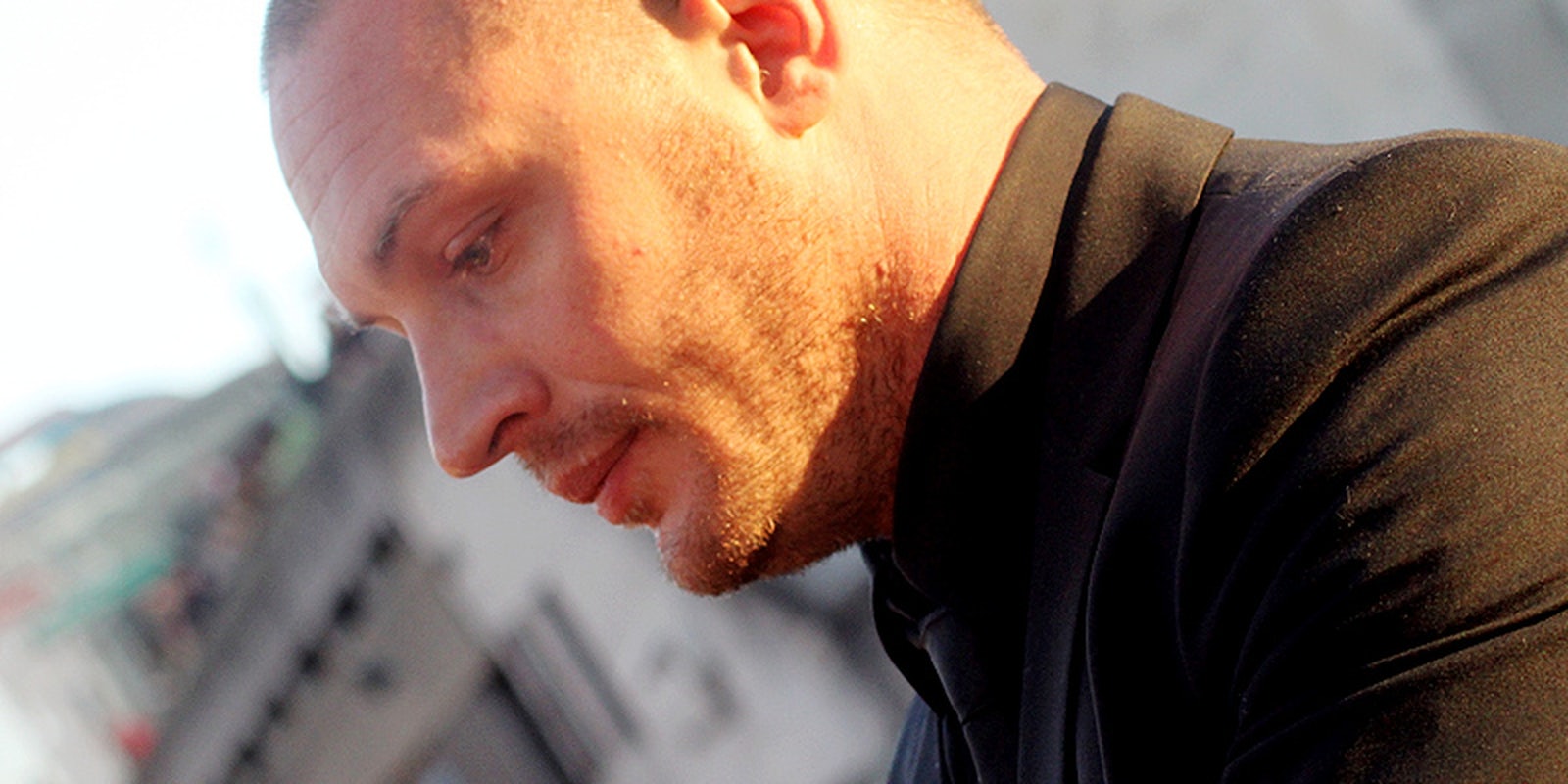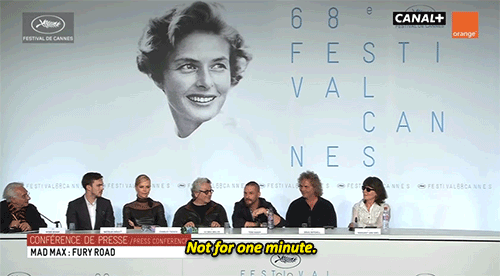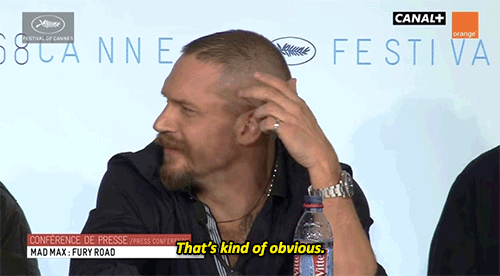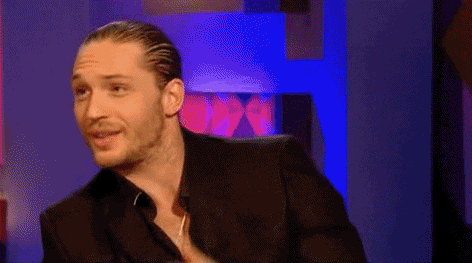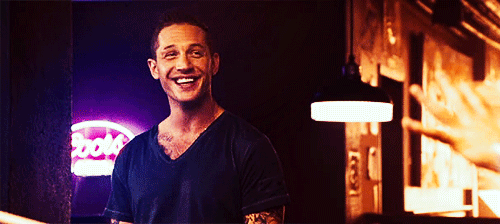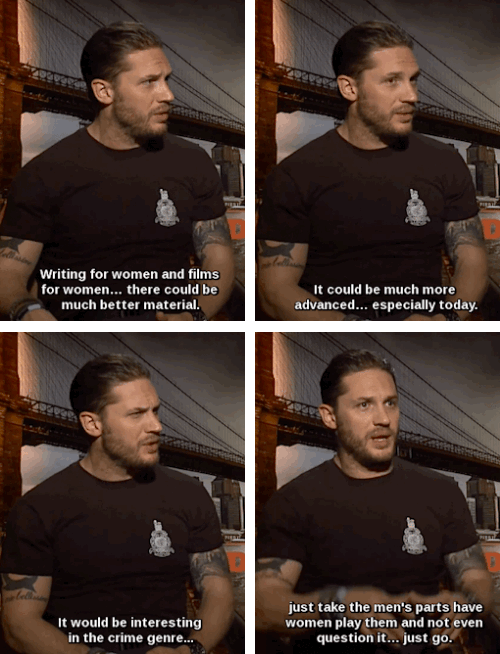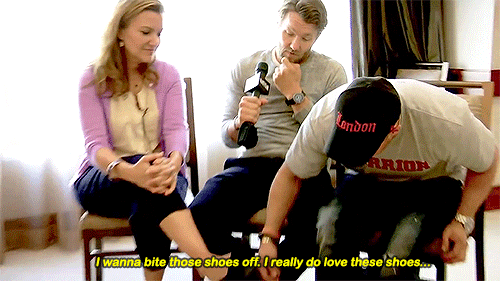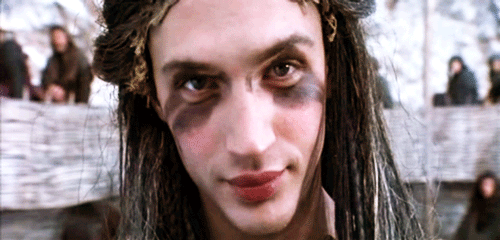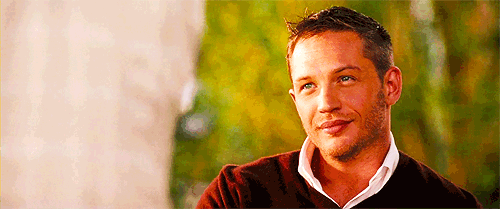In the wake of the partly feminist-driven success of Mad Max: Fury Road, Tom Hardy has been a hot commodity for more than his acting. The actor recently made a splash at Cannes for his baffled reaction to an interviewer who asked him if he ever wondered why so many women were in the script:
Although Hardy barely responded to the condescending question, his attitude here characterizes his attitude toward Hollywood’s sexist gender divide. Whenever he is confronted with sexism, or questions of gender, Hardy is typically blunt, honest, and eternally baffled, both by the sexist assumptions he runs into and by Hollywood’s rigid gender roles. Above all, he has consistently supported women in all walks of his life.
“Do you think there should be better parts for women than just girlfriend and wife or lover? Because I’m bored with that.”
After his Cannes shutdown, the rest of the world began hailing Hardy as someone who’d become a feminist hero overnight. But those of us who have followed Hardy’s career for years barely raised an eyebrow, because this is just one of many typical moments in which Hardy has proven himself a staunch, quiet supporter of women both in and out of the industry. His role as a feminist ally in Fury Road isn’t just fiction. Hardy is consistently challenging and questioning gender binaries, both in himself and in the society he lives in.
Here’s a truly inspirational breakdown of the many ways in which Tom Hardy is one of our favorite feminists.
Tom Hardy Constantly Supports Women, in and out of Hollywood
- He’s chivalrous: “I have to stop him from standing up for a woman’s honor all the bloody time” — Hardy’s wife, actress Charlotte Riley, speaking to Elle in 2012
“I feel intrinsically feminine.”
- He has no problem admitting that he wore dresses as a kid to help his mom: “Well, my mum makes dresses so I’ve had to be pinned into a few dresses in my time… anything to oblige.” — Hardy, speaking to Esquire in 2007
- He even helped sew a few: “Because my mum was my primary emotional caregiver growing up, I found myself being pinned into dresses, darting her dresses, choosing her high heels for the evening or what to wear.” — Speaking to the Daily Beast in 2011
- Hardy is so supportive of Bronson script writer Kelly Marcel that he wears a tattoo of the word “SKRIBE” in her honor. Recently he shared one of his famous selfies with fan site TomHardy.org. This selfie, however, was about his reaction to finishing her latest script. To accompany the picture, Hardy wrote:
Just read Marcels ( Kelly) latest script it is arguably the best script I have ever read She is killing it And I am so so so proud of her as an Artist and as a friend – tears and goose bumps just fkn awesome talent xxx
But Hardy isn’t only supportive of his friends. Although he was rumored to have clashed with Charlize Theron on the Mad Max set, he told Esquire last year he found those rumors “disappointing” and added:
I think she’s fucking awesome. I think she’s incredible. I think she’s one of the most talented actresses of our generation.
During the Mad Max press tour, Hardy consistently praised Theron. Speaking to AccessHollywood, he gleefully described how intense she was on set—while incidentally calling out Hollywood beauty standards:
Her transformation ability is second to none, really… I think it’s very brave for anybody to sort of shave their hair—I mean, for a female, I suppose, who’s also considered incredibly beautiful and a Christian Dior model, to say, ‘I’m going to shave my hair and be seen as a person, as personhood… and then I’m going to perform very physical, brutal viscerality’… she broke my nose by accident!…it was quite nice.
Hardy spends a lot of time talking about women and representation in film
In recent years, Hardy has been obviously preoccupied with the same problem the rest of us have been fixating on: developing meaningful roles for women and people of color in Hollywood.
“Playing a gay man in a Guy Ritchie movie is a finger up to that whole attitude of men talking about men doing men’s things, which is so fucking narrow-minded.”
Speaking to Metro in May, in an article about Mad Max and feminism, Hardy was effusive about the importance of having Theron as the film’s real protagonist because it would be a landmark role, one that would mean more representation for more people in the industry:
Mad Max is not actually in the driver’s seat in this movie. It’s about time you had better female leads in action movies. This is not a feminist argument, it’s a person-hood situation. This is how we ought to reflect the times — not so much strong women, but just people.
…
He’s a smart man, [director George Miller], so what he’s doing is reflecting the times as well as pioneering at the same time. He’s reading the times, what’s going on. And… it’s very clear that actually, right down to the shoulder pad on her left arm, [Charlize Theron] is the female protagonist of this movie.
Fury Road didn’t turn Hardy into an overnight feminist. Here he is discussing the lack of strong roles for women in Hollywood in an interview for 2013’s The Drop:
Writing for women in films could be much more…there could be much better material out there and it could be advanced a little more, especially today. It’d be interesting to take crime genre and replace men’s parts and have women play them. And not even question it. Just go.
In May, Hardy did a guest piece for Interview magazine in which he interviewed actor Matthias Schoenaerts. Hardy’s half of the interview is as interesting as Schoenaerts’, and the best moment is one in which he drops the current line of questions in order to go on a sudden tangent about women in Hollywood:
I identify with having strong, powerful female influences in my life. Do you think that women are fairly represented in screenplays, film, TV, and theater today? Or do you think there should be better parts for women than just girlfriend and wife or lover? Because I’m bored with that.
When Schoenaerts agrees, Hardy adds:
“There’s a long way to go on that, but I do believe that the time is now.”
Tom Hardy shuts down sexist interview questions
In 2012, Elle interviewed Hardy, ostensibly about his views on romance. Although we didn’t learn much from it about love, the entire interview is a master class from Hardy in how to shut down sexist questions through deflection and evasion.
At one point, the Elle interviewer asks, “Did you get into acting to meet women?” Hardy answers, but he refuses to mention women at all in his answer, steadily deflecting the idea of women as sex objects or of himself as a player.
Undaunted, the Elle interviewer tries again… and again:
Elle: Has a woman ever underestimated you?
Hardy: Women are so clever, I wouldn’t know it if one had.Elle: Do you have a favorite Catwoman?
Hardy: You can’t tempt me to answer a question about Catwoman with my missus in the car.
Elle: When was the last time a woman made you cry?
Hardy: No one’s ever made me cry. I’ve reacted. I’ve cried at the mercy of women and at the mercy of men.Elle: What did [your mother] teach you about women?
Hardy: It wasn’t just one thing. She’s a strong woman. But then you meet other strong women, and you realize they’re not all the same. You have to start learning new rules very quickly.
And of course, there’s the now-famous Cannes press conference for Fury Road. At around the 9:50 mark, the interviewer asks, “As you were reading the script, did you ever think, ‘Why are all these women in here? I thought this was supposed to be a man’s movie?’”
Hardy responds: “No. Not for one minute.”
Tom Hardy constantly undermines gender roles—including his own
Hardy’s sympathy with feminism seems to come partially from a place of bewilderment and wariness of gender roles. In countless interviews he’s been open about his own experimentation with gender, in particular his fear of rigid masculinity.
“I’m as masculine as an eggplant.”
Here he is, in a 2010 interview with the Globe, discussing his litany of tattoos. After the birth of his son, Louis, Hardy chose a tattoo of the Madonna and child. In the interview, he explains that the tattoo represents his view of himself being a good mother to his son:
That was about mothering me. I went through a lot of stuff leaving home and becoming a father and growing up to be my own mother. I have a mother; she’s amazing. But this is about being able to mother my parents and my son and myself—which is very painful. Getting my head around that growth spurt.
“I feel intrinsically feminine,” Hardy told Attitude in 2008. Although Hardy has never identified as non-binary, he has constantly expressed his feelings of being more aligned with women than men—including through his love of women’s clothes:
Tom Hardy and women’s shoes:
“It’s a fetish. I love classic, elegant women’s shoes. I find them incredibly sexy. High heels. Not just a stripper shoe but maybe a Louboutin or Jimmy Choo. “ —Hardy, speaking to Attitude in 2008
“I also have a fetish for women’s heels. I went to the Cartier polo this year. It was crazy. Full of posh women in high heels and pencil skirts dancing to “Goldigger.” I had no idea what to do.” — Hardy, speaking to InStyle
“I’ve got loads of trainers: Air Force Ones, Air Max, Jordan Fives… but what I really like is women’s shoes. Strappy heels and all that… I’m always looking out for women’s shoes. I buy my agent shoes.” — Hardy, speaking to Esquire in 2007
That time Tom Hardy wore a dress to the Oscars
In a May interview with Esquire, Hardy described how he celebrated for the Oscars. He didn’t attend the ceremony—he was filming at the time—but he still dressed up for the occasion, by wearing “a fetching black-and-white mini dress and red lipstick.”
Hardy also roundly mocked his Mad Max stunt double Jacob Tomuri for balking at the exercise in gender-bending:
“Jacob ‘Fearless’ Tomuri showed fear in the face of wearing a nice little number,” says Hardy, with a sigh. “I got him one anyway, but he wouldn’t get in it.”
Tom Hardy and masculinity
Above all else, Tom Hardy is full of thoughts about masculinity—toxic masculinity in particular. Encouraging his friends to crossdress is just one of many ways in which Hardy seems to constantly look for ways to undermine the association with manliness that his physical transformations for roles like Bronson and Bane have brought him.
“I’ve cried at the mercy of women and at the mercy of men.”
In 2008, he played the gay character Handsome Bob for Guy Ritchie’s film Rocknrolla. Speaking to Out about the role, he was blunt about how much of a subversion Bob was as a character:
“Masculine, butch groups of blokes together—it’s never really been my cup of tea. Playing a gay man in a Guy Ritchie movie is a finger up to that whole attitude of men talking about men doing men’s things, which is so fucking narrow-minded. Handsome Bob is what a man should be—except for the part of him taking a crowbar to the back of someone’s head.”
This question of “what a man should be” has preoccupied Hardy for most of his career. When Details asked him earlier this year what it meant to become a “great man,” Hardy responded with none of the usual tropes about duty and manning up. Instead, with his Fury Road character clearly on his mind, he delivered a thoughtful monologue about family, humility, and rejecting the idea of being manly at all:
A great man is largely forgotten by the public. He doesn’t stand on top of a mountain waving a flag saying, “Look at me—I’m a great man.” A great man often disappears into the ether. Hardly anyone notices that he was even there, apart from his family and close friends. He was reliable. He showed up. He was there. He was useful where he could be. He made mistakes. Tried to make better of those mistakes. Doesn’t mean you have to cure cancer or understand the theory of relativity. It’s not necessarily as rock-and-roll or as cool as you might think. Part of being a great man is accepting that. To dare to be average and normal is actually a pathway to becoming a great man. To have more humility. To accept responsibility more. To just get on with what’s in front of your face. And to leave no fucking indelible mark of your ever being here, apart from the fact that you were there for your family to the best of your ability. It’s not an easy task. I’ll probably fuck it up.
Then he underscored just how non-masculine his definition of a “great man” is with this:
“I’m the last person you need to ask about masculinity. I’m as masculine as an eggplant.”
Hardy has been open for years about his discomfort with the standard Hollywood image of masculinity, and men who fit that image. He has said repeatedly that he “fears” men. In 2008, speaking to Attitude, he described trying to join the military and realizing that he had “a real phobia about groups of men:”
I’m frightened of them, I’m much more comfortable around women. I’d love to be one of the boys but I always felt a bit on the outside. Maybe my masculine qualities come from over-compensating that I’m not one of the boys.
Six years later, speaking to Esquire, he repeated the story, and the fear:
I have always been frightened with men, to the point where I couldn’t go into a gym because of the testosterone, and I felt weak… I don’t feel very manly. I don’t feel rugged and strong and capable in real life, not how I imagine a man ought to be. So I seek it, to mimic it and maybe understand it, or maybe to draw it into my own reality.
Despite the fear, Hardy enjoys close friendships with other men. “There’s plenty of stuff in a relationship with another man, especially gay men, that I need in my life,” he told Attitude, adding, “A lot of gay men get my thing for shoes…”
The world’s general view of Tom Hardy is that he’s dark, unpredictable, and the ultimate man’s man, with the ability to bulk up and pack on pounds of muscle while portraying violent, rugged characters who embody testosterone-laden ideas of masculinity.
The reality is that Hardy himself is the polar opposite of this view of manliness, and he knows it. Responding to Details‘ description of him as “dangerous,” he shrugged off the label, as well as the charge of being overtly masculine:
The compelling nature of violence and danger is that it’s so much nicer to watch it onscreen than to be in the room with that person. See, I trust that I’m not really that person. So I laugh when I hear about the myths, and I quite like them as well.
All in all, Hardy may be as masculine as an eggplant—but we know a great man when we see one.
Photo via honeyfitz/Flickr (CC BY 2.0)

